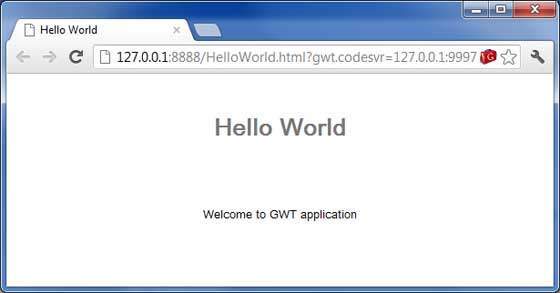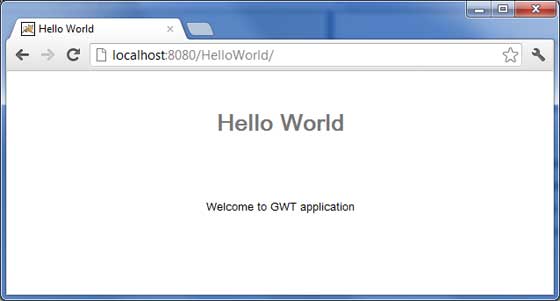GWT - 部署应用程序
本教程将向您解释如何创建应用程序 "war" 文件以及如何在 Apache Tomcat Websever 根目录中部署该文件。
如果您理解了这个简单示例,那么您也将能够按照相同的步骤部署复杂的 GWT 应用程序。
让我们使用 Eclipse IDE 和 GWT 插件,并按照以下步骤创建 GWT 应用程序 −
| 步骤 | 描述 | 1 | 在 com.tutorialspoint 包下创建一个名为 HelloWorld 的项目,如 GWT - 创建应用程序 中所述章节。 |
|---|---|
| 2 | 按照以下说明修改 HelloWorld.gwt.xml、HelloWorld.css、HelloWorld.html 和 HelloWorld.java。保持其余文件不变。 |
| 3 | 编译并运行应用程序以确保业务逻辑按要求运行。 |
| 4 | 最后,以 war 文件的形式压缩应用程序 war 文件夹的内容,并将其部署在 Apache Tomcat Web 服务器中。 |
| 5 | 按照最后一步中的说明,使用适当的 URL 启动您的 Web 应用程序。 |
以下是修改后的模块描述符 src/com.tutorialspoint/HelloWorld.gwt.xml 的内容。
<?xml version = "1.0" encoding = "UTF-8"?> <module rename-to = 'helloworld'> <!-- Inherit the core Web Toolkit stuff. --> <inherits name = 'com.google.gwt.user.User'/> <!-- Inherit the default GWT style sheet. --> <inherits name = 'com.google.gwt.user.theme.clean.Clean'/> <!-- Specify the app entry point class. --> <entry-point class = 'com.tutorialspoint.client.HelloWorld'/> <!-- Specify the paths for translatable code --> <source path = 'client'/> <source path = 'shared'/> </module>
以下是修改后的样式表文件war/HelloWorld.css的内容。
body {
text-align: center;
font-family: verdana, sans-serif;
}
h1 {
font-size: 2em;
font-weight: bold;
color: #777777;
margin: 40px 0px 70px;
text-align: center;
}
以下是修改后的 HTML 主机文件 war/HelloWorld.html 的内容。
<html>
<head>
<title>Hello World</title>
<link rel = "stylesheet" href = "HelloWorld.css"/>
<script language = "javascript" src = "helloworld/helloworld.nocache.js">
</script>
</head>
<body>
<h1>Hello World</h1>
<div id = "gwtContainer"></div>
</body>
</html>
我对上一个示例的 HTML 做了一些修改。在这里我创建了一个占位符 <div>...</div>,我们将使用入口点 java 类在其中插入一些内容。因此,让我们拥有 Java 文件 src/com.tutorialspoint/HelloWorld.java 的以下内容。
package com.tutorialspoint.client;
import com.google.gwt.core.client.EntryPoint;
import com.google.gwt.user.client.ui.HTML;
import com.google.gwt.user.client.ui.RootPanel;
public class HelloWorld implements EntryPoint {
public void onModuleLoad() {
HTML html = new HTML("<p>Welcome to GWT application</p>");
RootPanel.get("gwtContainer").add(html);
}
}
我们在这里创建了基本的小部件 HTML,并将其添加到 id="gwtContainer" 的 div 标签内。我们将在接下来的章节中研究不同的 GWT 小部件。
完成所有更改后,让我们像在 GWT - 创建应用程序 一章中所做的那样,在开发模式下编译并运行应用程序。如果您的应用程序一切正常,则将产生以下结果 −

创建 WAR 文件
现在我们的应用程序运行良好,我们准备将其导出为 war 文件。
按照以下步骤 −
进入项目的 war 目录 C:\workspace\HelloWorld\war
选择 war 目录中可用的所有文件和文件夹。
压缩所有选定的文件和文件夹文件夹中的一个名为 HelloWorld.zip 的文件。
将 HelloWorld.zip 重命名为 HelloWorld.war。
部署 WAR 文件
停止 tomcat 服务器。
将 HelloWorld.war 文件复制到 tomcat 安装目录 > webapps 文件夹。
启动 tomcat 服务器。
查看 webapps 目录,应该有一个文件夹 helloworld 被创建。
现在 HelloWorld.war 已成功部署在 Tomcat Webserver 根目录中。
运行应用程序
在 Web 浏览器中输入 URL:http://localhost:8080/HelloWorld 以启动应用程序
服务器名称 (localhost) 和端口 (8080) 可能因您的 tomcat 配置而异。



